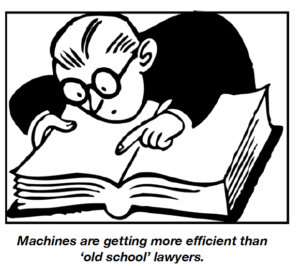 The basic premises of how the economy works have shifted under our feet and the government will have to respond.
The basic premises of how the economy works have shifted under our feet and the government will have to respond.
Gautam Mukunda – Writer
Can you imagine a conversation with a work Alexa giving you legal assistance instead of a human lawyer. Fasten your seatbelt. Legal and many other professions are being disrupted.
The path for a lifelong career, prestige, success, and a guaranteed meal ticket are no longer a sure thing. In the next couple of stories, we’ll look at a few ‘sure thing’ careers.
Story: Automation is impacting the legal profession. Smart machines can conduct legal research and background work more efficiently and economically than an army of $600 an hour lawyers. Legal automation already does e-discovery. A machine can search, curate, interpret, and analyze legal documents involved in a lawsuit faster and cheaper than lawyers.
 The machine can extract and analyze relevant information that is used in millions of documents just as accurately and capably as lawyers.
The machine can extract and analyze relevant information that is used in millions of documents just as accurately and capably as lawyers.
This is why law schools are seeing diminished attendance in many law schools. Law school applications have headed south each year (except for COVID) reflecting fewer work opportunities, soaring tuition, crushing student debt, and legal automation.
Law schools are calling the above disruption:
“revolution in law with the time bomb on their admissions book. … Thirty years ago, if you were looking to get on the escalator to upward mobility, you went to business or law school. Today, the law school escalator is broken.”
Work Lesson Earned: COVID will accelerate career disruptions. Post-COVID, the obituary for the many of today’s high-salary professions may go something like this:
“It seems likely that the top 10 to 20 percent of any profession — be they computer programmers, civil engineers, musicians, athletes or artists — will continue to do well,” he told me. “What happens to the bottom 20 percent, or even 80 percent, if that is the delineation? Will the bottom 80 percent be able to compete effectively against computer systems that are superior to human intelligence?”
Do you think this could be the FOW of your profession? What does this mean for the lower 20% in each profession? What’s the Return on Investment (ROI) of your profession? This should be an important part of your Working It Playbook?